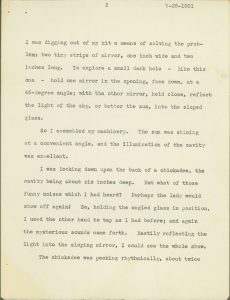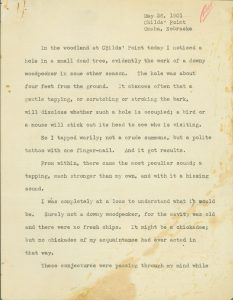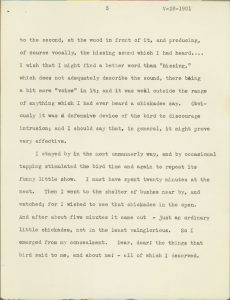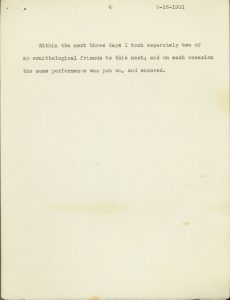Great Nebraska
Naturalists and Scientists
Frank H. Shoemaker
Childs’ Point
May 26, 1901
In the woodland at Childs Point today I noticed a hole in a small dead tree, evidently
the work of a downy woodpecker in some other season. The hole was about four feet
from the ground. It chances often that a gentle tapping, or scratching or stroking
the bark, will disclose whether such as hole is occupied; a bird or a mouse will stick
out its head to see who is visiting.
So I tapped warily; not a crude summons, but a polite tattoo with one finger-nail.
And it got results.
From within, there came the most peculiar sound; a tapping, much stronger than my
own, and with it a hissing sound.
I was completely at a loss to understand what it would be. Surely not a downy woodpecker, for the cavity was old and there were no fresh chips. It might be a chickadee; but no chickadee of my acquaintance had ever acted in that way.
These conjectures were passing through my mind while
2
I was digging out of my kit a means of solving the problem; two tiny strips of mirror,
one inch wide and two inches long. To explore a dark hole – like this one – hold one
mirror in the opening, face down, at a 45-degree angle; with the other mirror, held
close, reflect the light of the sky, or better the sun, into the sloped glass.
So I assembled my machinery. The sun was shining at a convenient angle, and the illumination
of the cavity was excellent.
I was looking down upon the back of a chickadee, the cavity being about six inches
deep. But what of those funny noises I had heard? Perhaps the lady would show off
again! So, holding the angled glass in position, I used the other hand to hap as I
had before; and again the mysterious sounds came forth. Hastily reflecting the light
into the sloping mirror, I could see the whole show.
The chickadee was peeking rhythmically, about twice
to the second, at the wood in front of it, and producing, of course vocally, the hissing
sound which I had heard…. I wish that I might find a better word than “hissing,”
which does not adequately describe the sound, there being a bit more “voice” in it;
and it was well outside the range of anything which I had every heard a chickadee
say. Obviously it was a defensive device of the bird to discourage intrusion; and
I should say that, in general, it might prove very effective.
I stayed by in the most unmannerly way, and by occasional tapping stimulated the bird
time and again to repeat its funny little show. I must have spent twenty minutes at
the nest. Then I went to the shelter of bushes near by, and watched; for I wished
to see that chickadee in the open. And after about five minutes it came our – just an ordinary little chickadee, not in the least vainglorious. So I emerged from my concealment. Dear, Dear; the
things that bird said to me, and about me! – all of which I deserved.
Within the next three days I took separately two of my ornithological friends to this
nest; and on each occasion the same performance was put on, and encored.


